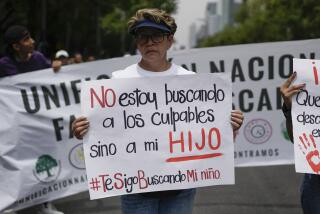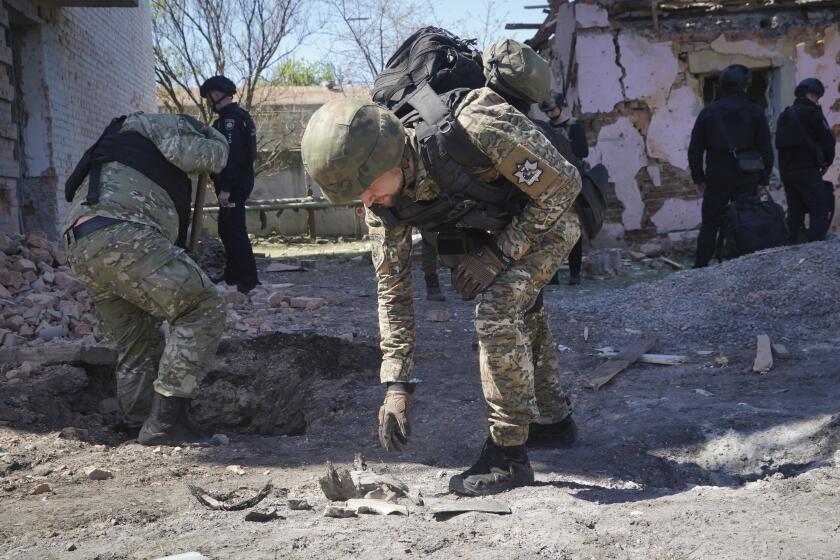A New Tilt Toward N. Korea
President Bush has called North Korea part of an “axis of evil” and said that he “loathed” its leader, Kim Jong Il, but now he’s embraced a strategy of wary engagement with the isolated communist state much like former President Clinton did.
By signing an agreement with North Korea this week, the Bush administration committed in principle to normalizing relations with the country for the first time since the Korean War ended in 1953. In exchange, the United States and its allies secured a promise from North Korea to abandon all its nuclear weapons and nuclear programs, submit to international inspections and rejoin the Nuclear Nonproliferation Treaty.
But a day after signing the deal in Beijing, the administration Tuesday found itself defending the pact amid North Korea’s insistence that it would abandon its weapons only if the U.S. first gave it a civilian light-water nuclear reactor. The fresh demand caused consternation in Washington and gave critics of the deal more ammunition.
Secretary of State Condoleezza Rice and Assistant Secretary of State Christopher Hill, the chief U.S. negotiator at the six-nation nuclear talks, said the United States would not discuss a light-water reactor for North Korea unless it gave up its nuclear weapons and programs.
“They knew exactly what was” in the deal, Hill said in an interview Tuesday. “They didn’t like some of the aspects of it, but they knew it was a good deal for them and they took it. The fact that they continue to negotiate after the deal is hardly surprising.... They’re sort of spouting off to internal audiences.”
U.S. officials stressed that North Korea signed the disarmament pledge not only with the United States, but also with China, Japan, South Korea and Russia, and that the Pyongyang government knew that disarming would be subject to stringent international verification.
Rice met in Washington on Tuesday with the Chinese foreign minister, and said the two agreed that the text signed in Beijing was binding. In addition, Bush spoke with South Korean President Roh Moo-hyun and they agreed that verifying the disarmament was a key part of the deal, White House Press Secretary Scott McClellan said.
“We cannot have a situation where they’re pretending to disarm and we’re pretending to believe them,” Hill said. Only time will tell whether North Korea will keep its promise, he said, adding, “We did not negotiate a freeze, we negotiated getting rid of these weapons, and [that is] in our country’s interest.”
Still, both critics and supporters of the deal agreed that the text left the thorniest issues unresolved, particularly the timing of concessions and rewards. And they warned that failure to agree on a timetable for North Korea to disarm and receive energy assistance could easily kill the deal when talks resume in November.
“It’s a great accomplishment that it sets out an agreed destination for the first time,” said Mitchell B. Reiss, a former State Department director of policy planning under Bush. “It’s unclear whether we’ll get there or not.”
But skeptics are worried that the Bush administration, having hailed the agreement as a potential breakthrough, will feel more pressure to make concessions to North Korea to avoid diplomatic failure.
“The North Koreans are behaving just like you’d predict,” said Gary Schmitt, executive director of the Project for the New American Century, a neoconservative group in Washington. “For every i that has to be dotted and t that has to be crossed, the North Koreans are going to demand their ounce of gold. So not only is it going to be a difficult road, I’m not sure we’ll ever get to the end of it.”
Nevertheless, Schmitt said, “The world is what it is, and the North Koreans almost certainly have nuclear weapons, so you have to deal with the realities you’re confronted with.”
Even before North Korea’s latest demand, some conservatives had denounced the deal, saying it would only bolster an oppressive government and set a bad precedent for U.S. dealings with Iran and other countries that may want to become nuclear powers.
“What we’ve got at best is a pig in the poke,” said Frank J. Gaffney Jr., a former Defense Department official and president of the Center for Security Policy, a conservative Washington think tank. “At worse, we have perpetuated this regime and enabled it to continue what it’s been doing” -- improving its arsenal and threatening its neighbors while making promises it doesn’t live up to, he said.
Gaffney said he hoped Congress would impose “adult supervision” on the Bush administration by rejecting the deal.
Sen. Sam Brownback (R-Kan.) said he was “not satisfied” with the agreement because it did not address human rights violations in North Korea. He said he would seek to hold up funding for the deal in Congress.
Negotiations with the Soviet Union on crucial nuclear disarmament pacts in the 1980s “didn’t keep us from condemning it or calling it an evil empire, and this regime in North Korea remains evil, even if it is recognized,” Brownback said in an interview.
Some critics of the Bush administration said it had done an about-face on North Korea policy, but they praised the new direction as long overdue.
“Certainly, there’s a change in their approach to the North Koreans. They’re doing what they said they wouldn’t do,” said Robert Gallucci, a former State Department official who negotiated a disarmament agreement with North Korea during the Clinton administration. “But they are now doing the right thing.”
Conservatives have long criticized the defunct “Agreed Framework,” a 1994 deal between the Clinton administration and Pyongyang. Under that agreement, energy-deficient North Korea said it would mothball its plutonium programs and forgo nuclear weapons in exchange for oil shipments and the construction of light-water nuclear reactors by an international consortium. In 2000, the Clinton administration signed a declaration agreeing to normalize relations with North Korea.
Once the Bush administration took office, then-Secretary of State Colin L. Powell said in 2001 that he planned to pick up negotiations where Clinton left off, but was overridden by the White House. Relations between the two countries soured further after the Bush administration confronted North Korea with evidence of a secret uranium enrichment program.
Under the agreement signed this week, Washington and the other parties promised North Korea unspecified energy assistance and other benefits, but did not pledge to complete construction of the reactors, which are about one-third built. Instead, the text says the parties will discuss providing a reactor at an unspecified “appropriate time.”
Administration officials said leaving the issue of reactors for later made the new agreement better. Still to be negotiated is how much the North Koreans must disarm before they can begin to reap rewards.
“It does share the [Clinton] formula in that essentially, the North Koreans, for their breaking out of the Nuclear Nonproliferation Treaty and breaking their agreement with the Clinton administration, are going to get a long list of goodies,” Schmitt said.
A senior State Department official, speaking on condition of anonymity, said any comparison between the Clinton deal and Monday’s pact was “just bogus” because the Bush administration was not promising North Korea a reactor or any other benefits before disarmament.
But others said a similar deal could’ve been reached four years ago if Powell had been allowed to negotiate with North Korea.
“The fact that Powell’s gone and Rice is in [as secretary of State] has made it much easier to cut these kinds of deals,” said Joel S. Wit, a former State Department official who under Clinton led a nuclear inspection team to North Korea. “This kind of agreement could have been reached with North Korea a long time ago, and we could have avoided the damage that has been done in the meantime.”
*
Times staff writers Maggie Farley in New York and Tyler Marshall in Washington contributed to this report.
More to Read
Start your day right
Sign up for Essential California for news, features and recommendations from the L.A. Times and beyond in your inbox six days a week.
You may occasionally receive promotional content from the Los Angeles Times.






